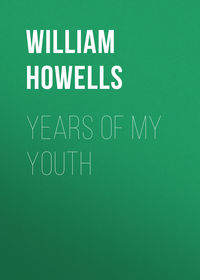 полная версия
полная версияThe Quality of Mercy
"Well, at least, it's out, my dear," said his wife, who noted the final effect of his sufferings across the table, and saw him pause bewildered from the last paper he had dropped. "There's that comfort."
"Is that a comfort?" he asked, huskily.
"Why, yes, I think it is. The suspense is over, and now you can begin to pick yourself up."
"I suppose there's something in that." He kept looking at Matt, or rather, at the copy of the Abstract which Matt was hiding behind, and he said, "What have you got there, Matt?"
"Perhaps I'd better read it out," said Matt. "It seems to me most uncommonly good. I wonder who could have done it!"
"Suppose you do your wondering afterwards," said his father impatiently; and Matt began to read. The positions of the article were not such as Hilary could have taken, probably, if he had been in a different mood; its implications were, some of them, such as he must have decidedly refused; but the temper of the whole was so humane, so forbearing, so enlightened, that Hilary was in a glow of personal gratitude to the writer, for what he called his common decency, by the time the reading was over. "That is a very extraordinary article," he said, and he joined Matt in wondering who could have done it, with the usual effect in such cases.
"I wish," said Mrs. Hilary, "that every other newspaper could be kept from those poor things." She meant Northwick's daughters, and she added, "If they must know the facts, they couldn't be more mercifully told them."
"Why, that was what I was thinking, mother," said Matt. "But they can't be kept to this version, unhappily. The misery will have to come on them shapelessly, as all our miseries do. I don't know that the other papers are so bad – "
"Not bad!" cried his father.
"No. They're not unkind to them, except as they are just to him. They probably represent fairly enough the average thinking and feeling about the matter; the thing they'll have to meet all their lives and get used to. But I wish I knew who did this Abstract article; I should like to thank him."
"The question is, now," said Mrs. Hilary, "What can we do for them there? Are you sure you made it clear to them, Matt, that we were willing to have them come to us, no matter what happened?"
"Louise and I both tried to do that," said her son, "when we were there together; and when I reported to them after Wellwater, I told them again and again what our wish was."
"Well," said Mrs. Hilary, "I am glad we have done everything we could. At first I doubted the wisdom of your taking Louise to see them; but now I'm satisfied that it was right. And I'm satisfied that your father did right in getting that wretched creature the chance he abused."
"Oh, yes," said Matt. "That was right. And I'm thoroughly glad he's out of it. If he's still alive, I'm glad he's out of it."
Hilary had kept silent, miserably involved in his various remorses and misgivings, but now he broke out. "And I think you're talking abominable nonsense, Matt. I didn't get Northwick given that chance to enable him to escape the consequences of his rascality. Why shouldn't he be punished for it?"
"Because it wouldn't do the least good, to him or to any one else. It wouldn't reform him, it wouldn't reform anything. Northwick isn't the disease; he's merely the symptom. You can suppress him; but that won't cure the disease. It's the whole social body that's sick, as this article in the Abstract implies."
"I don't see any such implication in it," his father angrily retorted. "Your theory would form an excuse for the scoundrelism of every scoundrel unhung. Where is the cure of the social body to begin if it doesn't begin at home, with every man in it? I tell you, it would be a very good thing for Northwick, and every rogue like him, if he could be made serve his term in State's prison."
The controversy raged a long time without departing from these lines of argument on either side. Mrs. Hilary listened with the impatience women feel at every absence from the personal ground, the only ground of reality. When Matt had got so far from it as to be saying to his father, "Then I understand you to maintain that if A is properly punished for his sins, B will practice virtue in the same circumstances and under the same temptations that were too much for A," his mother tried to break in upon them. She did not know much about the metaphysical rights and wrongs of the question; she only felt that Matt was getting his father, who loved him so proudly and indulgently, into a corner, and she saw that this was unseemly. Besides, when anything wrong happens, a woman always wants some one punished; some woman, first, or then some other woman's men kindred. Every woman is a conservative in this, and Mrs. Hilary made up her mind to stop the talk between her son and husband, because she felt Matt to be doubly wrong.
But when she spoke, her husband roared at her, "Don't interrupt, Sarah!" and then he roared at Matt, "I tell you that the individual is not concerned in the matter! I tell you that it is the interest, the necessity of the community to punish A for his sins without regard to B, and for my part, I shall leave no stone unturned till we have found Northwick, dead or alive; and if he is alive, I shall spare no effort to have him brought to trial, conviction and punishment." He shouted these words out, and thumped the breakfast table so that the spoons clattered in the cups, and Mrs. Hilary could hardly hear what Patrick was saying just inside the door.
"To see Mr. Hilary? A lady? Did she send her card?"
"She wouldn't give her name, ma'am; she said she didn't wish to, ma'am. She wished to see Mr. Hilary just a moment in the reception-room."
Hilary was leaning forward to give the table another bang with his fist, but his wife succeeded in stopping him, with a repetition of Patrick's message.
"I won't see her," he answered. "It's probably a woman reporter. They're in our very bread trough. I tell you," he went on to Matt, "there are claims upon you as a citizen, as a social factor, which annul all your sentimental obligations to B as a brother. God bless my soul! Isn't C a brother, too, and all the rest of the alphabet? If A robs the other letters, then let B take a lesson from the wholesome fact that A's little game has landed him in jail."
"Oh, I admit that the A's had better suffer for their sins; but I doubt if the punishment which a man gets against his will is the right kind of suffering. If this man had come forward voluntarily, and offered to bear the penalty he had risked by his misdeed, it would have been a good thing for himself and for everybody else; it would have been a real warning. But he ran away."
"And so he ought to be allowed to stay away! You are a pretty Dogberry come to judgment! You would convict a thief by letting him steal out of your company."
"It seems to me that's what you did, father. And I think you did right, as I've told you."
"What I did?" shouted Hilary. "No, sir, I did nothing of the kind! I gave him a chance to make himself an honest man – "
"My dear," said Mrs. Hilary, "you must go and get rid of that woman, at least; or let me."
Hilary flung down his napkin, and red from argument cast a dazed look about him, and without really quite knowing what he was about rushed out of the room.
His wife hardly had time to say, "You oughtn't to have got into a dispute with your father, Matt, when you know he's been so perplexed," before they heard his voice call out, "Good heavens, my poor child!" For the present they could not know that this was a cry of dismay at the apparition of Suzette Northwick, who met him in the reception-room with the demand:
"What is this about my father, Mr. Hilary?"
"About your father, my dear?" He took the hands she put out to him with her words, and tried to think what pitying and helpful thing he could say. She got them away from him, and held one fast with the other.
"Is it true?" she asked.
He permitted himself the pretence of not understanding her; he had to do it. "Why, we hope – we hope it isn't true. Nothing more is known about his being in the accident than we knew at first. Didn't Matt – "
"It isn't that. It's worse than that. It's that other thing – that the papers say – that he was a defaulter – dishonest. Is that true?"
"Oh, no, no! Nothing of the kind, my dear!" Hilary had to say this; he felt that it would be inhuman to say anything else; nothing else would have been possible. "Those newspapers – confound them! – you know how they get things all – You needn't mind what the papers say."
"But why should they say anything about my father, at such a time, when he's – What does it all mean, Mr. Hilary? I don't believe the papers, and so I came to you – as soon as I could, this morning. I knew you would tell me the truth. You have known my father so long; and you know how good he is! I – You know that he never wronged any one – that he couldn't!"
"Of course, of course!" said Hilary. "It was quite right to come to me – quite right. How – how is your sister? You must stay, now – Louise isn't down, yet – and have breakfast with her. I've just left Mrs. Hilary at the table. You must join us. She can assure you – Matt is quite confident that there's nothing to be distressed about in regard to the – He – "
Hilary kept bustling aimlessly about as he spoke these vague phrases, and he now tried to have her go out of the room before him; but she dropped into a chair, and he had to stay.
"I want you to tell me, Mr. Hilary, whether there is the slightest foundation for what the papers say this morning?"
"How, foundation? My dear child – "
"Has there been any trouble between my father and the company?"
"Well – well, there are always questions arising."
"Is there any question of my father's accounts – his honesty?"
"People question everything nowadays, when there is so much – want of confidence in business. There have to be investigations, from time to time."
"And has there been any reason to suspect my father? Does any one suspect him?"
Hilary looked round the room with a roving eye, that he could not bring to bear upon the girl's face. "Why, I suppose that some of us – some of the directors – have had doubts – "
"Have you?"
"My dear girl – my poor child! You couldn't understand. But I can truly say, that when this examination – when the subject came up for discussion at the board-meeting, I felt warranted in insisting that your father should have time to make it all right. He said he could; and we agreed that he should have the chance." Hilary said this for the sake of the girl; and he was truly ashamed of the magnanimous face it put upon his part in the affair. He went on: "It is such a very, very common thing for people in positions of trust to use the resources in their charge, and then replace them, that these things happen every day, and no harm is meant, and none is done – unless – unless the venture turns out unfortunately. It's not an isolated case!" Hilary felt that he was getting on now, though he was aware that he was talking very immorally; but he knew that he was not corrupting the poor child before him, and that he was doing his best to console her, to comfort her. "The whole affair was very well put in the Abstract. Have you seen it? You must see that, and not mind what the other papers say. Come in to Mrs. Hilary – we have the paper – "
Suzette rose. "Then some of the directors believe that my father has been taking the money of the company, as the papers say?"
"Their believing this or that, is nothing to the point – "
"Do you?"
"I can't say – I don't think he meant – He expected to restore it, of course. He was given time for that." Hilary hesitated, and then he thought he had better say: "But he had certainly been employing the company's funds in his private enterprises."
"That is all," said the girl, and she now preceded Hilary out of the room. It was with inexpressible relief that he looked up and saw Louise coming down the stairs.
"Why, Sue!" she cried; and she flew down the steps, and threw her arms around her friend's neck. "Oh, Sue, Sue!" she said, in that voice a woman uses to let another woman know that she understands and sympathizes utterly with her.
Suzette coldly undid her clasping arms. "Let me go, Louise."
"No, no! You shan't go. I want you – you must stay with us, now. I know Matt doesn't believe at all in that dreadful report."
"That wouldn't be anything now, even if it were true. There's another report – don't you know it? – in the paper this morning." Louise tried to look unconscious in the slight pause Suzette made before she said: "And your father has been saying my father is a thief."
"Oh, papa!" Louise wailed out.
It was outrageously unfair and ungrateful of them both; and Hilary gave a roar of grief and protest. Suzette escaped from Louise, and before he could hinder it, flashed by Hilary to the street door, and was gone.
XX
The sorrow that turned to shame in other eyes remained sorrow to Northwick's daughters. When their father did not come back, or make any sign of being anywhere in life, they reverted to their first belief, and accepted the fact of his death. But it was a condition of their grief, that they must refuse any thought of guilt in him. Their love began to work that touching miracle which is possible in women's hearts, and to establish a faith in his honor which no proof of his dishonesty could shake.
Even if they could have believed all the things those newspapers accused him of, they might not have seen the blame that others did in his acts. But as women, they could not make the fine distinctions that men make in business morality, and as Northwick's daughters, they knew that he would not have done what he did if it was wrong. Their father had borrowed other people's money, intending to pay it back, and then had lost his own, and could not; that was all.
With every difference of temperament they agreed upon this, and they were agreed that it would be a sort of treason to his memory if they encouraged the charges against him by making any change in their life. But it was a relief to them, especially to Suzette, who held the purse, when the changes began to make themselves, and their costly establishment fell away, through the discontent and anxiety of this servant and that, till none were left but Elbridge Newton and his wife. She had nothing to do now but grieve for the child she had lost, and she willingly came in to help about the kitchen and parlor work, while her husband looked after the horses and cattle as well as he could, and tended the furnaces, and saw that the plants in the greenhouses did not freeze. He was up early and late; he had no poetic loyalty to the Northwicks; but as nearly as he could explain his devotion, they had always treated him well, and he could not bear to see things run behind.
Day after day went by, and week after week, and the sisters lived on in the solitude to which the compassion, the diffidence, or the contempt of their neighbors left them. Adeline saw Wade, whenever he came to the house, where he felt it his duty and his privilege to bring the consolation that his office empowered him to offer in any house of mourning; but Suzette would not see him; she sent him grateful messages and promises, when he called, and bade Adeline tell him each time that the next time she hoped to see him.
One of the ladies of South Hatboro', a Mrs. Munger, who spent her winters as well as her summers there, penetrated as far as the library, upon her own sense of what was due to herself as a neighbor; but she failed to find either of the sisters. She had to content herself with urging Mrs. Morrell, the wife of the doctor, to join her in a second attempt upon their privacy; but Mrs. Morrell had formed a notion of Suzette's character and temper adverse to the motherly impulse of pity which she would have felt for any one else in the girl's position. Mrs. Gerrish, the wife of the leading merchant in Hatboro', who distinguished himself by coming up from Boston with Northwick, on the very day of the directors' meeting, would have joined Mrs. Munger, but her husband forbade her. He had stood out against the whole community in his belief in Northwick's integrity and solvency; and while every one else accused him of running away as soon as he was reported among the missing in the railroad accident, Gerrish had refused to admit it. The defalcation came upon him like thunder out of a clear sky; he felt himself disgraced before his fellow-citizens; and he resented the deceit which Northwick had tacitly practised upon him. He was impatient of the law's delays in seizing the property the defaulter had left behind him, and which was now clearly the property of his creditors. Other people in Hatboro', those who had been the readiest to suspect Northwick, cherished a guilty leniency toward him in their thoughts. Some believed that he had gone to his account in other courts; some that he was still alive in poverty and exile, which were punishment enough, as far as he was concerned. But Gerrish demanded something exemplary, something dramatic from the law. He blamed the Ponkwasset directors for a species of incivism, in failing to have Northwick indicted at once, dead or alive.
"Why don't they turn his family out of that house, and hand it over to the stockholders he has robbed?" he asked one morning in the chance conclave of loungers in his store. "I understand it is this man Hilary, in Boston, who has shielded and – and protected him from the start, and – and right along. I don't know why; but if I was one of the Ponkwasset stockholders, I think I should. I should make a point of inquiring why Northwick's family went on living in my house after he had plundered me of everything he could lay his hands on."
The lawyer Putney was present, and he shifted the tobacco he had in one cheek to the other cheek, and set his little, firm jaw. "Well, Billy, I'll tell you why. Because the house, and farm, and all the real estate belong to Northwick's family and not to Northwick's creditors." The listeners laughed, and Putney went on, "That was a point that brother Northwick looked after a good while ago, I guess. I guess he must have done it as long ago as when you first wanted his statue put on top of the soldier's monument."
"I never wanted his statue put on top of the soldier's monument!" Mr. Gerrish retorted angrily.
Putney's spree was past, and he was in the full enjoyment of the contempt for Gerrish, which was apt to turn to profound respect when he was in his cups. He was himself aware of the anomalous transition by which he then became a leader of conservative feeling on all subjects and one of the staunchest friends of the status; he said it was the worst thing he knew against the existing condition of things. He went on, now: "Didn't you? Well, I think it would look better than that girl they've got there in circus-clothes." They all laughed; Putney had a different form of derision for the Victory of the soldier's monument every time he spoke of it. "And it would suggest what those poor fellows really died for: that we could have more and more Northwicks, and a whole Northwick system of things. Heigh? You see, Billy, I don't have to be so hard on the Northwicks, personally, because I regard them as a necessary part of the system. What would become of the laws and the courts if there were no rogues? We must have Northwicks. It's a pity that the Northwicks should have families; but I don't blame the Northwicks for providing against the evil day that Northwickism is sure to end in. I'm glad the roof can't be taken from over those women's heads; I respect the paternal love and foresight of J. Milton in deeding the property to them."
"It's downright robbery of his creditors for them to keep it!" Gerrish shouted.
"Oh, no, it isn't, Billy. It's law. You must respect the law and the rights of property. You'll be wanting the strikers to burn down the shoe-shops the next time we have trouble here. You're getting awfully incendiary, Billy."
Putney carried the laugh against Gerrish, but there were some of the group, and there were many people in Hatboro', including most of the women, who felt the want of exemplary measures in dealing with Northwick's case. These ladies did not see the sense of letting those girls live on just as if nothing had happened, in a house that their father's crimes had forfeited to his victims, while plenty of honest people did not know where they were going to sleep that night, or where the next mouthful of victuals was to come from. It was not really the houseless and the hungry who complained of this injustice; it was not even those who toiled for their daily bread in the Hatboro' shops who said such things. They were too busy, and then too tired, to think much about them, and the noise of Northwick's misdeeds died first amid the din of machinery. It was in the close, stove-heated parlors of the respectable citizens, behind the windows that had so long commanded envious views of the Northwicks going by in their carriages and sledges, and among women of leisure and conscience, that his infamy endured, and that the injuries of his creditors cried out for vengeance on those daughters of his; they had always thought themselves too good to speak to other folks. Such women could not understand what the Ponkwasset Mills Company meant by not turning those girls right out of doors, and perhaps they could not have been taught why the company had no power to do this, or why the president, at least, had no wish to do it. When they learned that his family still kept up friendly relations with the Northwick girls, they were not without their suspicions, which were not long in becoming their express belief, that the Hilarys were sharing in the booty. They were not cruel, and would not really have liked to see the Northwick girls suffer, if it had come to that; but they were greedy of the vengeance promised upon the wicked, and they had no fear of judging or of meting with the fullest measure.
In the freer air of the streets and stores and offices, their husbands were not so eager. In fact, it might be said that no man was eager but Gerrish. After the first excitement, and the successive shocks of sensation imparted by the newspapers had passed, there came over the men of Hatboro' a sort of resignation which might or might not be regarded as proof of a general demoralization. The defalcation had startled them, but it could not be said to have surprised any one; it was to be expected of a man in Northwick's position; it happened every day somewhere, and the day had come when it should happen there. They did not say God was good and that Mahomet was His prophet, but they were fatalists all the same. They accepted the accomplished fact, and, reflecting that the disaster did not really concern them, many of them regarded it dispassionately, even jocosely. They did not care for a lot of rich people in Boston who had been supplying Northwick with funds to gamble in stocks; it was not as if the Hatboro' bank had been wrecked, and hard-working folks had lost their deposits. They could look at the matter with an impartial eye, and in their hearts they obscurely believed that any member of the Ponkwasset Company would have done the same thing as Northwick if he had got the chance. Beyond that they were mostly interested in the question whether Northwick had perished in the railroad accident, or had put up a job on the public, and was possessing his soul in peace somewhere in Rogue's Rest, as Putney called the Dominion of Canada. Putney represented the party in favor of Northwick's survival; and Gates, the provision man, led the opposite faction. When Putney dropped in to order his marketing, he usually said something like, "Well, Joel, how's cremation, this morning?"
"Just booming, Squire. That stock's coming up, right along. Bound to be worth a hundred cents on the dollar before hayin', yet." This, or something like it, was what Gates usually answered, but one morning he asked, "Heard how it stands with the Ponkwasset folks, I suppose? They say – paper does – that the reason the president hung off from making a complaint was that he didn't rightly see how he could have the ashes indicted. He believes in it, any way."
"Well," said Putney, "the fathers of New England all died in the blessed hope of infant damnation. But that didn't prove it."









